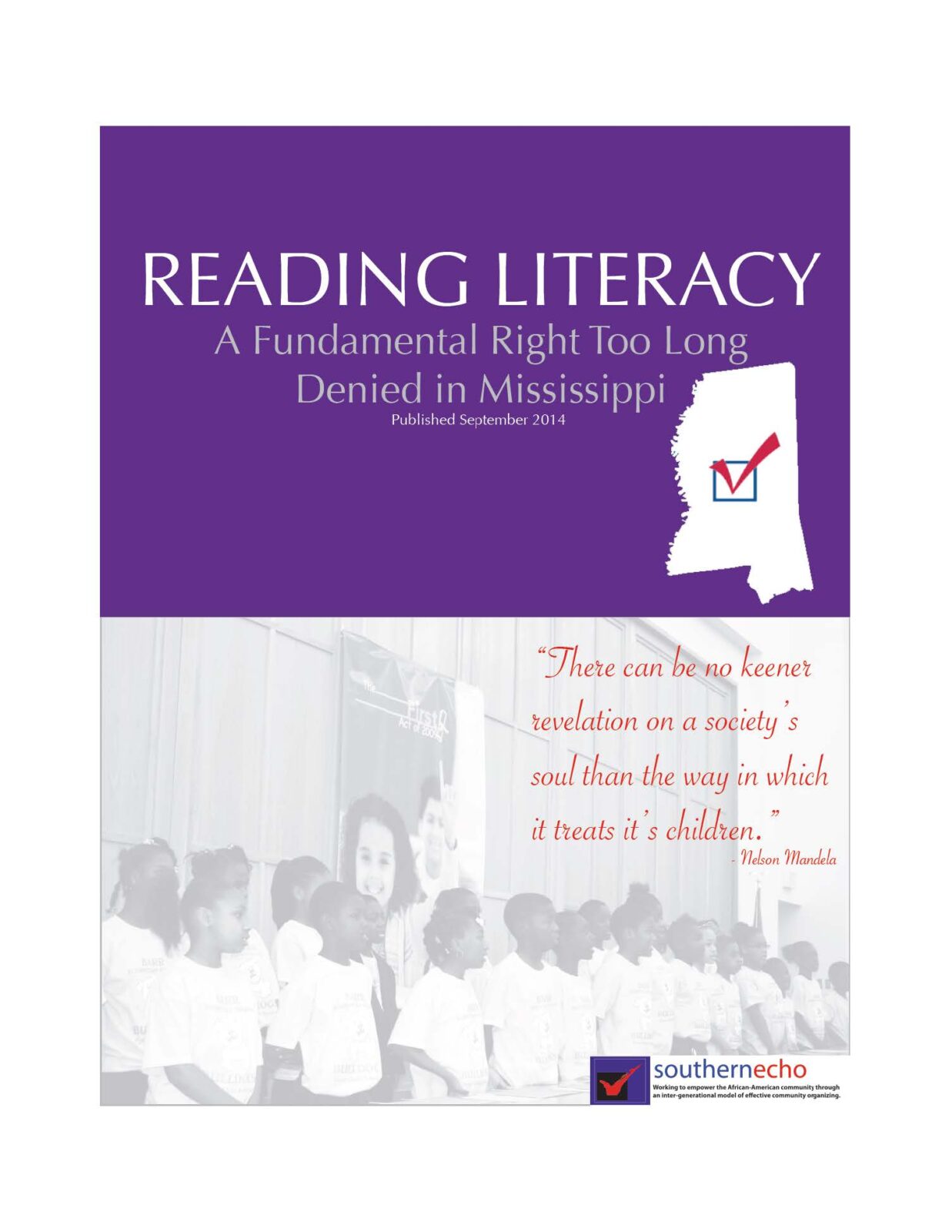 October 13, 2014 – Southern Echo has put together in spreadsheets some more available data on the reading literacy dilemma confronting all of Mississippi’s public school districts.
October 13, 2014 – Southern Echo has put together in spreadsheets some more available data on the reading literacy dilemma confronting all of Mississippi’s public school districts.
Echo has also revised it’s spreadsheet on “A” ranked districts because it did not include 4 of the “A” ranked districts — Amory, Biloxi, Booneville and Clinton — in the previous spreadsheet that was published.
Here is some of what we learn when we analyze the data for the 140 districts for which we have data. The numbers are not exact due to rounding. [Note: We have not included any data for the current North Bolivar, West Bolivar or Sunflower districts because their consolidations with other districts did not complete until 2014. These 3 consolidations involved 8 prior-existing districts in the Delta.]
STATEWIDE
TOTAL # 3rd GRADE STUDENTS TESTED 2012-2013 MCT2 LANGUAGE ARTS: 36,905
TOTAL # 3rd GRADE STUDENTS SCORED BASIC + MINIMUM [BELOW PROFICIENT]: 15,227
PERCENT of 3rd GRADE STUDENTS READING BELOW GRADE LEVEL 2012-2013: 41%
IF we can expect that STATEWIDE:
- In the 1st and 2nd grades there are a comparable number of students to the number of students in the 3rd grade, AND
- The percent of students with reading deficiencies in the 1st and 2nd grades is approximately the same as the students in the 3rd grade, AND
- Students with reading deficiencies in the 1st, 2nd and 3rd grades must all receive the intervention and supports mandated by the Literacy-Based Promotion Act,
THEN it is reasonable to project that STATEWIDE:
- Currently, the total number of students combined in 1st, 2nd and 3rd grades in need of reading literacy intervention and supports is three (3) times as large as the number of students in need in the 3rd grade, to wit: 45,681.
The data can be broken out further:
NUMBER OF 3rd GRADE STUDENTS READING BELOW GRADE LEVEL
(i.e. Basic + Minimum) BY DISTRICT GRADE RANKS “A” to “F”:
19 “A” Districts: 2,425 ( x 3 for Grades 1 thru 3 = 7,275)
42 “B” Districts: 4,629 ( x 3 for Grades 1 thru 3 = 13,887)
35 “C” Districts: 3,031 ( x 3 for Grades 1 thru 3 = 9,093)
36 “D” Districts: 4,237 ( x 3 for Grades 1 thru 3 = 12,711)
8 “F” Districts: 842 ( x 3 for Grades 1 thru 3 = 2,526)
COMPARE HIGHER PERFORMING AND LOWER PERFORMING DISTRICTS
RE: NUMBER OF 3rd Grade STUDENTS READING BELOW GRADE LEVEL:
“A” and “B” Districts combined = 7,054 ( x 3 for Grades 1 thru 3 = 21,162)
“A”, “B” and “C” Districts combined = 10,085 ( x 3 for Grades 1 thru 3 = 30,255)
“D” and”F” Districts combined = 5,079 ( x 3 for Grades 1 thru 3 = 15,237)
THE LITERACY PROGRAM MANDATES SHOULD INTEGRATE WITH MDE RESPONSE TO INTERVENTION REGULATIONS
The 2013 Literacy-Based Promotion Act requires that as soon as a student is assessed as having a reading deficiency, whether in K, 1st, 2nd or 3rd grade, the district and school are duty-bound to immediately provide that student with various forms of assistance to remove the deficiency in reading.
The MS Dept. of Education Response to Intervention (RTI) regulations and guidelines require that as soon as a student is identified as having an academic or behavioral problem the district and school are duty-bound to immediately institute procedures to address the problem. Reading deficiency is the kind of academic problem that comes within the purview of RTI. It might also have a complementary behavioral component that needs to be addressed.
The new MDE Literacy Program Implementation Guide, posted on the MDE website, is explicit that the Reading Literacy programs and RTI shall (must) integrate their processes to support students, parents and teachers to work together to alleviate and eliminate a student’s reading deficiencies.
IT’S NOT ENOUGH TO BE RIGHTEOUS, NOR SUFFICIENT TO LEGISLATE MANDATES. THE READING LITERACY DILEMMA WE FACE REQUIRES MAJOR NEW RESOURCES TO PROVIDE THE TRAINING, INTERVENTION AND SUPPORTS TO EDUCATORS, STUDENTS AND PARENTS NECESSARY TO IMPLEMENT THE LITERACY MANDATES EFFECTIVELY!
The MS Legislature must change course to properly fund the Literacy Program. Among other things, this will require a demonstration that there is a public will among education stakeholders across the state that the moral center of our public policy ought to prioritize reading literacy for our children, which opens the gate to their opportunity and well-being, rather than maintain and increase tax reductions for successful corporations and businesses to swell their profit margins.

